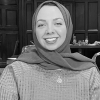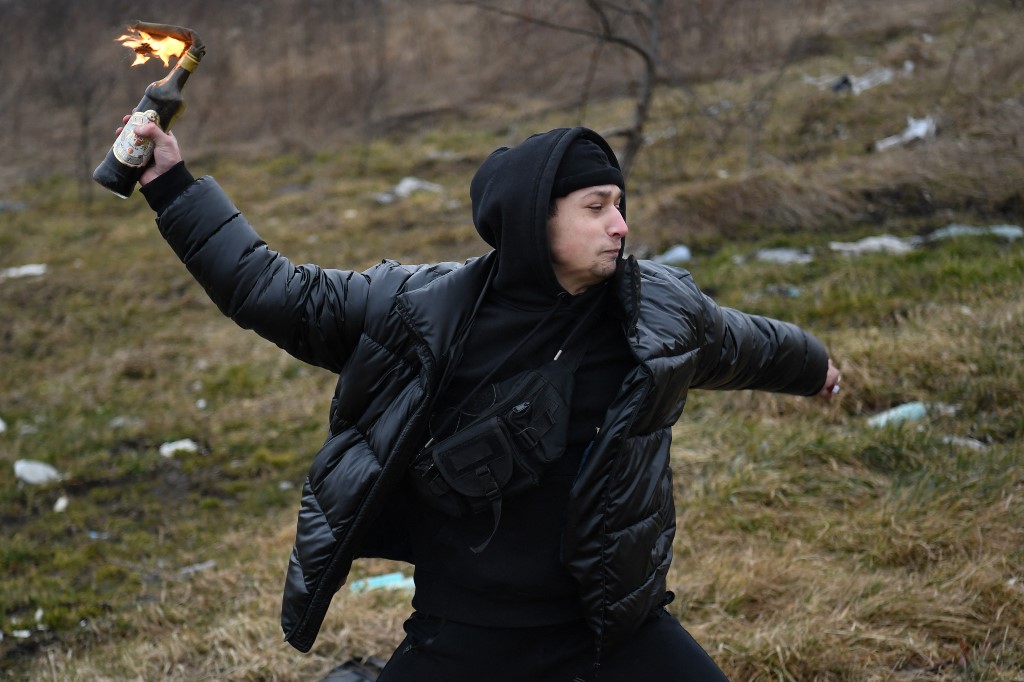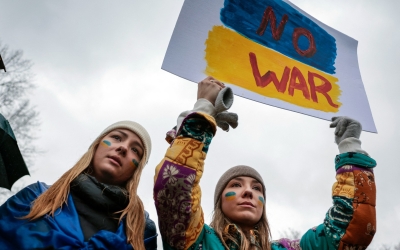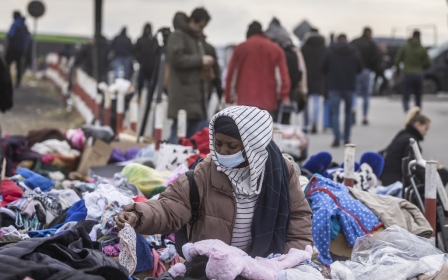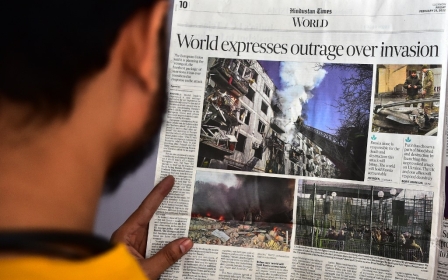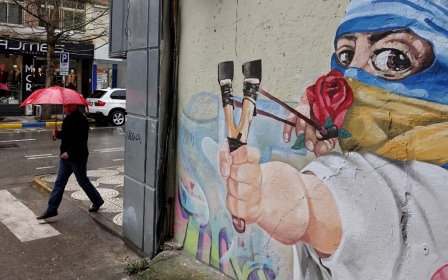Why is Ukrainian resistance celebrated but Palestinians' condemned?

I didn’t think I’d ever turn on the television to see the UK's national broadcaster live-streaming the making of Molotov cocktails as though it was a weather report or a segment on local elections.
As the reporter heralded the bravery and acumen of these women - teachers, nurses and lawyers - who had united to help defend their country against the ruthlessness of invading Russian forces, I couldn’t help but think: if these were brown-skinned women called Zainab or Khadija, somewhere in the Middle East or North Africa, with covered heads and sparse English, would we be watching a step-by-step tutorial of them making bombs on the news? Would their actions be celebrated as courageous - inspirational, even? Of course, we already know the answer.
Institutions that are staunchly apolitical in the face of all other injustices are now tweeting Ukrainian flags
It goes without saying that Russia’s invasion of Ukraine is senseless and cruel - a savage imperial campaign to bolster one man’s ego and power at the cost of countless innocent lives. Quite rightly, the actions of the Russian state have been condemned by all, from politicians and celebrities to everyday people on social media. Solidarity, fundraising and support for Ukraine have been widespread, while Russia has faced severe international sanctions and boycotts.
It has been harrowing, and a little surprising, to see such a reaction from the British public, who often remain oblivious and unmoved by events in the rest of the world. Apparently, if you have the right shade of skin, the correct eye colour and a certain socioeconomic status, your suffering will inspire worldwide outrage and global empathy. Buildings will transform into the colour of your flag, and people who see themselves in you will raise money for clothes, shelter, food and medicine - and even weapons for your protection.
Vastly different coverage
New MEE newsletter: Jerusalem Dispatch
Sign up to get the latest insights and analysis on Israel-Palestine, alongside Turkey Unpacked and other MEE newsletters
But the global reaction to Ukraine isn’t just about sympathy and verbal support. The western world sees Ukrainian self-defence as a noble and necessary pursuit. Suddenly, politicians with a track record of supporting invasions when the site is some faraway Black or brown land are publicly urging Russia to cease, and providing artillery to bolster the Ukrainian defence.
Public figures and celebrities who, at best, share meaningless placations such as “I call for peace on both sides” in other conflicts, are openly denouncing not just Russia, but Russian culture at large. Institutions that are staunchly apolitical in the face of all other injustices are now tweeting Ukrainian flags and calls to fundraise for charity - and even for weapons. British men with no ties to Ukraine and no military experience have taken up arms to defend their fellow European state.
But when Black and brown civilians do what Ukrainians are doing - defending their homes against foreign invaders, and fighting oppressive imperialist forces - the coverage is vastly different. Black and brown people - whether Palestinian, Somali, Yemeni or Afghan - are portrayed as inherently violent and predisposed to conflict, their bodies so worthless that their plight is ignored and even vilified.
This double-standard is deeply racist. Self-defence is heavily entrenched in white supremacy and Islamophobia. It is racialised: the privilege of some, and a means to criminalise others.
When done by white-skinned westerners, it is noble; a necessary pursuit that fellow westerners can comprehend and legitimise, awakening their own nationalism that has been dormant since somewhere around World War Two. But for Black and brown inhabitants of the Global South, it is used to criminalise and perpetuate pre-existing ideas of them as violent savages born into inescapable states of suffering.
Convenient excuse
In a throwback to colonial and Orientalist ideals, Black and brown people, especially men, are deliberately pathologised as possessing a unique kind of violence and aggression. This conveniently excuses western inaction in the face of their suffering, and condones ferocious foreign policies enacted upon them. It serves the narrative that “barbaric” Black and brown people need to be liberated by superior western ethics and brute military force.
The western collective consciousness is so used to this perpetual idea of the Black and brown person as innately backwards and brutal, that their actions of self-defence are seen as synonymous with terrorism - even when they are no different to those of Ukrainians.
To see this in action, all we need to do is look at the global reaction to Israel’s escalation of aggression towards Palestinians, which has become synonymous with Ramadan in recent years.
Soldiers assaulting Muslim worshippers who are on their hands and knees praying is retold as “skirmishes”. The storming of al-Aqsa Mosque, the third-holiest site for Muslims, along with the blockading of its doors and the indiscriminate firing of tear gas by Israeli soldiers, is passed off as “renewed tensions”. Reporters and politicians portray Palestinian self-defence as the cause of the conflict - as though rocks are any match for artillery. News articles allude to the coinciding of Ramadan, Passover and Easter, as though the violence is the result of religious zealots, not settler-colonialism.
British Prime Minister Boris Johnson remains silent, and US President Joe Biden calls for an end to violence on both sides, purposefully obscuring the vastly uneven power dynamic. And all the while, Gulf countries use their wealth and influence to cosy up to the colonialist state, further undermining the plight of Palestinians.
Equating coloniser and colonised
Nobody calls for “both sides” to put down their weapons in the Ukraine war. Quite rightly, the onus is on the Russian state to halt its attack. Nobody implies that Ukrainian self-defence is further fuelling the conflict; if only they’d simply allow Russian forces to invade and decimate, rape and pillage their way through the country.
This would be unthinkable. And yet, this is the way the Palestinian plight is portrayed in western media. The eye-wateringly uneven comparison between little boys with rocks against a highly armed, aggressive military state, with the backing of governments and global corporations, is whittled down to “clashes” in the news. The coloniser and colonised are deliberately, dangerously and deceptively rendered equals.
This is the purposeful erasure of marginalised Black and brown voices, deliberately designed to perpetuate their suffering at the hands of western states
Of course, this is nothing new, even though earlier this year, Amnesty International released a report outlining the apartheid enacted by the Israeli state, describing it as the “institutionalised and prolonged racist oppression of millions of people” and a “crime against humanity”. Yet, the western world still willfully ignores the plight of the Palestinian people. Anti-racist discourse excludes them. Anti-colonial movements turn a blind eye.
In a land as ancient and historically significant as Palestine, it’s easy for the West to distort the illegal occupation as an age-old, senseless war that springs from innate Arab violence and a refusal to coexist.
Whereas social media is filled with support for Ukraine, those with high profiles have spoken out about how they face shadow bans and plummeting follower counts for posting about crimes enacted by the state of Israel. Dutch-Palestinian model Bella Hadid even claimed that Instagram had suppressed her stories about Palestine.
If the world can view Ukrainian self-defence as valiant, then why not that of people in Iraq, Afghanistan or Palestine? Make no mistake: this is the purposeful erasure of marginalised Black and brown voices, deliberately designed to perpetuate their suffering at the hands of western states. Self-defence is intentionally so doused in racist neocolonial ideas, that to even voice support for the “wrong” kind of victim becomes tantamount to condoning terror.
The views expressed in this article belong to the author and do not necessarily reflect the editorial policy of Middle East Eye.
Middle East Eye delivers independent and unrivalled coverage and analysis of the Middle East, North Africa and beyond. To learn more about republishing this content and the associated fees, please fill out this form. More about MEE can be found here.


